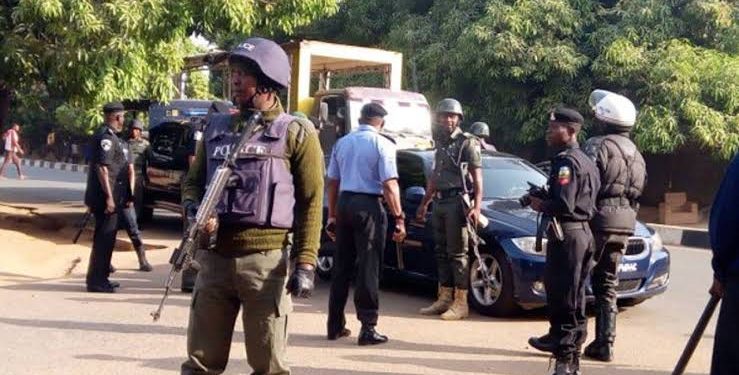Security experts at a virtual meeting organised by the Nigeria Diaspora Network (NDN), United Kingdom (UK) chapter, have said that a well coordinated community policing system would address the present security challenge in Nigeria.
Some of the participants, who spoke at the meeting monitored by the News Agency of Nigeria (NAN) in Abuja, stressed that all hands must be on deck to check security problems.
The title of the meeting was: “Security Challenges and Community Policing.”
A security expert in Global Community Policing, Dr Aminu Audu, was optimistic that if adopted in line with international best practice, community policing would work in the country.
Audu, who authored a publication titled: ”Police Corruption and Community Policing in Nigeria: A Sociological Case Study,” said the issue of insecurity was not a new thing in the country.
“What we are seeing today is a product of series of activities that have transpired in the past. So it is a build up,” he said.
He said though there is insecurity in Nigeria, the way forward is community policing.
“According to Freeman in 1992, community policing is about policy and strategy to achieve more effective crime control, reduce fear of crime, improve quality of life, improve police services and police legitimacy through proactive reliance on community resources that seeks to change crime causing conditions,” he said.
He stated further that community policing would ensure the need for greater accountability of police, greater public share in decision making and greater concern for civil rights and liberty.
Audu said it was disheartening that when talking about community policing, “what comes to our minds is about forming vigilante group and arming them with weapons for them to begin to delve into prejudicial killings and manhandling of crime suspects.
“No, that is not the way. Community policing is about the police, the community coming together to address issues, most especially crime causing conditions.
“Now we are talking about insecurity, what happens
to poverty? How has poverty being addressed?
“Who are the people sponsoring those who carry guns?
“For example, I read sometimes ago that about 400 people have been arrested on allegation that they are sponsoring Boko Haram, I don’t know what has happened to them?”
The expert, who acknowledged the influence of foreign factor in the security challenge, said community policing would not be a success if the problem of poverty and other factors were not addressed.
He also said over the years, community policing had not worked effectively in the country because there has been a wide communication gap between the community and the security providers.
He urged people to desist from politicising the initiative.
“Do we really practice community policing accurately? So the problem is that it has been a guess work affairs,” he said.
Audu, however, commended President Muhammadu Buhari for his support for community policing.
“I really commend President Buhari for taking the step to implement community policing with a funding investment to the tune of about 26 million pounce.
“But how many governors or local government chairmen have taken it upon themselves to implement these policies according to specification?” he asked.
The National Economic Council (NEC) in a virtual meeting chaired by Vice-President Yemi Osinbajo had, on Aug. 20, 2020, approved the sum of N13.3 billion for the take-off of community policing initiative across the country.
“I am happy that the Federal Government is implementing based on empirical research. Now at the moment, they are undergoing process,” Audu said.
A Preventive Terrorism Consultant, Mr Temitope Olodo, said all the stakeholders should be ready to take it seriously if community policing would
work.
He said the system was the easiest way of policing but corruption had been the bane.
He said people had to own community policing to work.
“Community policing is all about people telling the authority what the security needs are and channelling the effort and resources to those areas to tackle them,” he added.
He also said to solve the problem, the country needed to look at the past and how we got to this present position.
According to Olodo, in Nigeria, we are not policing by consent, we are policing by force.
“If we police by consent, a lot of things that are happening in Nigeria will not be happening. I think that is where we have got it wrong,” he said.
Olodo, who is the president, African Security Forum and a retired Metropolitan police officer in the UK, enjoined the Federal Government to introduce a system of Key Performance Indicator (KPI) to measure the performance of all security officers
in the country.
“We need practical changes that we can turn around and say, this is the change that we want.
“I was a formal civil servant. If you ask me today, I have never seen the job description of IGP (inspector-general of police) and I am not making it personal.
“I don’t know what kind of KPI he is being measured against but I can tell you that we know the KPI of commissioner of police for the Metropolitan Police, we know the one for New York, Australia, etc.
“We know how police are being measured.
I was once a constable and I have KPI.
“When I was leaving the Metropolitan Police on secondment, I was measured on KPI.
“They brought out my KPI and that was the basis upon which if I am entitled to other benefits, in terms of my salary going up.
“But I don’t know what KPIs are for the Nigerian
police. If there is no KPI, what do you measure them against?” he asked.
Olodo explained that if there is no KPI, security officers’ performance indicators would not be proportionate to their work done.
A Cyber Security Professional, Mr Deji Adebayo, who is one of the NDN coordinators in the UK, said the meeting was organise as part of the effort by Nigerians living abroad to see how the security challenge could be solved towards creating a better and secured society for the country.
Other members of the NDN at the meeting include Dr Aminu Ahmadu, a lecturer and academic consultant within the UK universities; Mr Offor Okpanachi, an AML professional, among others.
NDN is an association of Nigerian professionals, who have come together to see how Nigeria can be moved forward.
NAN



